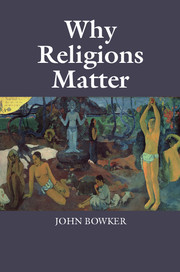Book contents
4 - Religions and sciences
II Dogmatism and doubt
Published online by Cambridge University Press: 05 April 2015
Summary
The contrast between dogmatism and doubt was expressed succinctly by Claude Bernard (1813–78):
Scholastics or Systematizers never question their starting point, to which they seek to refer everything; they have a proud and intolerant mind, and do not accept contradiction.... The experimenter, on the contrary, who always doubts and who does not believe that he possesses absolute certainty about anything, succeeds in mastering the phenomena which surround him, and in extending his power over nature.... The doubter is a true man of science; he doubts only himself and his interpretations, but he believes in science.
(Bernard 1.2)In more recent times, the same contrast is often made. Sam Harris stated (p.43) that “the problem with religion – as with Nazism, Stalinism, or any other totalitarian mythology – is the problem of dogma itself.” To call dogma problematic depends of course on what is meant by the word ‘dogma’. In its original Greek context, the word δογμα meant nothing more than an opinion or a belief. It is connected with the verb δοκειν, which means ‘to appear’ or ‘to seem to be the case’. In other words, it meant something far more tentative than our understanding of the word ‘dogma’. But from that beginning, the word dogma came to mean in Greek a public decree or law or ordinance, something that cannot be contradicted or even argued against.
So the word ‘dogma’, like the words ‘myth’ and ‘sceptic’ (also derived from Greek), has changed and taken on a new meaning. For us the word ‘dogmatic’ has come to mean ‘laying down an opinion in a way not open to argument’, and a dogmatist is a person, as Burnyeat once put it (p.27), “with an obstinate and unreasonable attachment to his opinions.” As Galbraith observed, “When people are least sure, they are often most dogmatic”; or as Ring Lardner put it more briefly in The Young Immigrants: “‘Shut up’, he explained.”
- Type
- Chapter
- Information
- Why Religions Matter , pp. 65 - 104Publisher: Cambridge University PressPrint publication year: 2015



